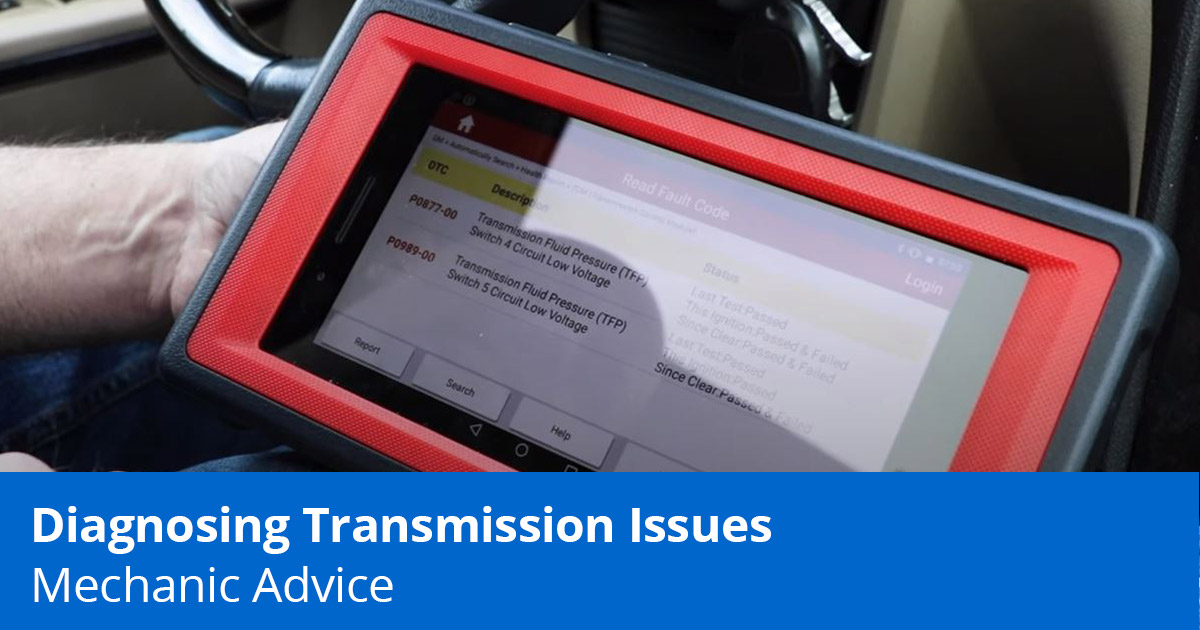3 Transmission Problems You Shouldn’t Ignore

The transmission helps to determine at what speed your vehicle should move. It also controls the amount of power that should be sent to the wheels. You’ll probably hardly notice the shift between gears when driving your car, but if you do your vehicle could have one or more automatic transmission problems. If you notice your transmission slipping or jerking, you should get the issue diagnosed right away.
Signs You May Have a Problem with Your Transmission
When the transmission shifts hard or jerks from one gear to another, it could be a warning that you need to have it checked. An inspection will help determine whether you’ll need a simple fix or a major repair. Below are three of the most common signs that’ll tell you there’s a problem with your automatic transmission.
1. Low Transmission Fluid
The transmission fluid helps to lubricate moving parts, facilitate gear shifts, and cools the transmission. Like other automotive fluids, it ages and loses its frictional properties. It can also run low especially if there’s a leak. To check the fluid, make sure the engine is running at its operating temperature.
You can tell a lot by taking a look at your transmission fluid. If it’s low, it will cause a deficiency in the hydraulic pressure needed to shift the gears. A burnt smell in the fluid is also a sign that your transmission is overheating or damaged. You’ll need to pull out the transmission to see what could be wrong. Simply draining out the fluid and filling it up will not fix the problem.
2. Vibrations and a Jerking Transmission
A jerking transmission is one of the most common automatic transmission problems you’ll encounter while driving your car. You’ll feel the vehicle shift a little weird at slow acceleration, medium acceleration, or fast acceleration. If you feel the transmission slipping or jerking, you should try to diagnose the cause as soon as possible, before the potential repairs become much more expensive.
As the vehicle moves from one gear to another, listen keenly as you also feel for bumps and jerking. You also want to pay attention to how the vehicle downshifts. Slight bumps that are almost unnoticeable are normal. What you want to look out for are shifts that feel like they are completely out of place.
At highway speeds of about 60 mph, you may also feel vibrations or hear a heavy-duty droning sound. This is normally a sign that the torque convertor needs a replacement. The torque converter uses fluid to send power to the transmission and to prevent the engine from stopping. You’ll want to have that checked and fixed by a professional.

3. Low Transmission Fluid Pressure
You may not be able to find out that your car has a low transmission fluid pressure problem until you run it through a scan tool. The problem normally pops up when you have an issue with the transmission control module (TCM).
The TCM controls how the transmission gears shift. It collects and processes signals from the transmission to ensure gears are shifting consistently and effectively. When it’s not working properly, you may notice a change in how the vehicle changes gears. This change can often be described as the transmission slipping.
The TCM has diaphragms that go over the pressure sensors. They may rip and come out. You’ll have to replace the entire TCM since you can’t change or fix the diaphragms alone. If there was also a jerk when the car was shifting from one gear to another, you may also need to have the entire transmission checked.
4. Bonus Signs of Automatic Transmission Problems
Other signs that could indicate your car has an automatic transmission problem include:
1. A check engine light that stays on.
2. Delayed engagement when you shift the car from one gear to another.
3. Unusual groaning, ticking, or whining noises when you shift the car to Neutral.
4. A vehicle that won’t go into gear.
Shop Parts in this Post:
Related Content:
- Why Is My Service Engine Soon Light On?
- How Do I Check Or Add Automatic Transmission Fluid To My Car Or Truck?
- Signs of transmission failure and ways to prevent it
- Reddish Fluid Leaking From Your Car?
.


After my car sits overnight, I drive it for the first time in the morning and it takes forever to shift out of first gear. Once it shifts out of first gear for the first time, i don`t have any problems shifting out of any gear, even first. Whst could be causing this to happen?
I changed out my ball joints and I immediately started having shifting problems, what could I have done to my car and what can I do to fix this issue before I ultimately have to replace the transmission as a whole
My car jerks to a stop when I come to a complete stop. When depressing the brake to stop, it jerks after I come to a complete stop.
My 2002 Accord only has 67k mi & I’m the only owner.
What does this strange “second jerking stop” mean?
It’s nice that you mentioned how a jerking transmission is one of the most common automatic transmission problems you’ll encounter while driving your car. I’ve been feeling some weird movements in my car recently and it might be due to a bad transmission. It would not be good to just let it be, so I’ll ask a transmission repair specialist to check it out.
While driving it slips then goes into gear really hard. Then after driving for a while park it and when you try to start it it will die if you dont keep it running